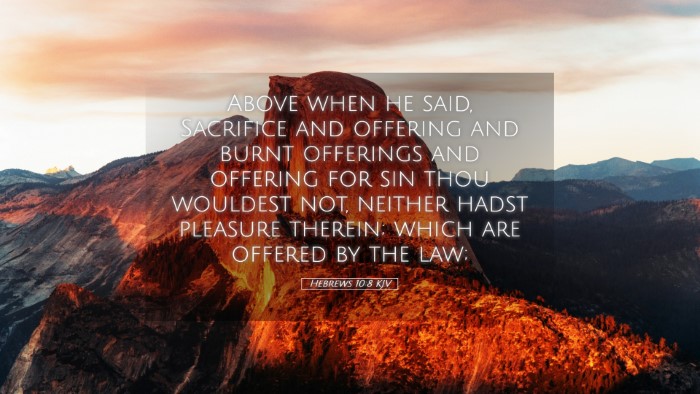Commentary on Hebrews 10:8
Verse Explanation: The verse states, "Above when he said, Sacrifice and offering and burnt offerings and offering for sin thou wouldest not, neither hadst pleasure therein; which are offered by the law." This portion of scripture succinctly encapsulates the essence of the Old Covenant sacrifices as it relates to the New Covenant in Christ.
Overview of the Passage
This citation reflects a profound theological assertion—God's displeasure in the ceremonial sacrifices prescribed by the Mosaic law. It indicates a transition from the Old Covenant, characterized by sacrifices and offerings, to a new era inaugurated through Christ's perfect sacrifice. By employing the prophetic words of the Psalmist, the writer of Hebrews emphasizes that these rituals are insufficient for true atonement.
Commentary Insights
Matthew Henry's Commentary
Matthew Henry observes that the writer of Hebrews is demonstrating that God’s will was never fully satisfied with the sacrifices that the law required. He stresses that while these sacrifices were commanded, they were ultimately preparatory and foreshadowed the ultimate sacrifice of Christ. Henry notes that the passage serves to reinforce the point that the sacrifices offered under the law lacked the intrinsic value required to truly remove sin. They were merely external rites without an internal transformation. Matthew Henry concludes that true obedience to God requires more than mere ritual; it demands a heart inclined towards Him.
Albert Barnes' Commentary
Albert Barnes emphasizes the significance of understanding the departure of the sacrifices from their intended purpose. He notes that the law was never intended to be the final answer for sin; it merely highlighted the need for a more excellent way. Barnes elucidates that God was not pleased with the blood of bulls and goats, not because the law was flawed, but because it pointed to a greater reality—Christ's sufficiency as the sacrificial Lamb. He emphasizes that the sacrifices served a purpose in God's redemptive plan, yet they were insufficient to achieve reconciliation between God and humanity in a deep and abiding manner.
Adam Clarke's Commentary
Adam Clarke adds depth to the understanding of sacrifices by delving into the contextual significance of the Old Testament sacrificial system. He articulates that the phrase "neither hadst pleasure therein" reveals God's perspective on mere ritualistic worship devoid of obedience and faith. Clarke describes how the repetition of sacrifices indicated a lack of real atonement and how they pointed to the inadequacy of human works to achieve divine satisfaction. Clarke sees this text as a call to authentic faith that leverages the ultimate sacrifice of Christ, thus urging believers to abandon reliance on ineffective rituals.
The Theological Implications
The insights drawn from these commentaries reveal essential theological implications surrounding Hebrews 10:8. The discontentment of God with ritual alone speaks volumes regarding the nature of true worship. It highlights a transformative relationship that God desires with humanity—one that transcends ceremonial observance.
- Transition from Old Covenant to New Covenant: The verse serves as a pivotal point in understanding the shift towards Christ's redemptive work.
- Rejection of Works-Based Righteousness: The commentary reinforces that reliance on external acts does not yield true righteousness before God.
- Implication for Contemporary Worship: The discussion invites reflection on modern practices in worship, challenging believers to seek sincerity over mere performance.
Practical Applications
For present-day believers, pastors, and scholars, Hebrews 10:8 challenges us to reassess the motivations behind our worship and service. It prompts an examination of heart posture—are we merely going through the motions, or are we pursuing a genuine relationship with God? The commentaries collectively encourage:
- To cultivate an understanding of the heart of worship as rooted in love for God rather than obligation.
- To engage in practices that foster deep, personal connections with Christ, embracing His sacrifice and grace.
- To communicate the significance of Christ's fulfillment of the law in both teaching and personal evangelism.
Conclusion
This verse from Hebrews encapsulates a critical moment in biblical revelation where the inadequacy of the Old Covenant offerings is made clear. Drawing from the insights of Henry, Barnes, and Clarke, we see a unified message that emphasizes the necessity of Christ's ultimate sacrifice for the true remission of sins. As believers reflect on these principles, they are reminded that God seeks not just rituals but transformed lives responsive to His grace.


